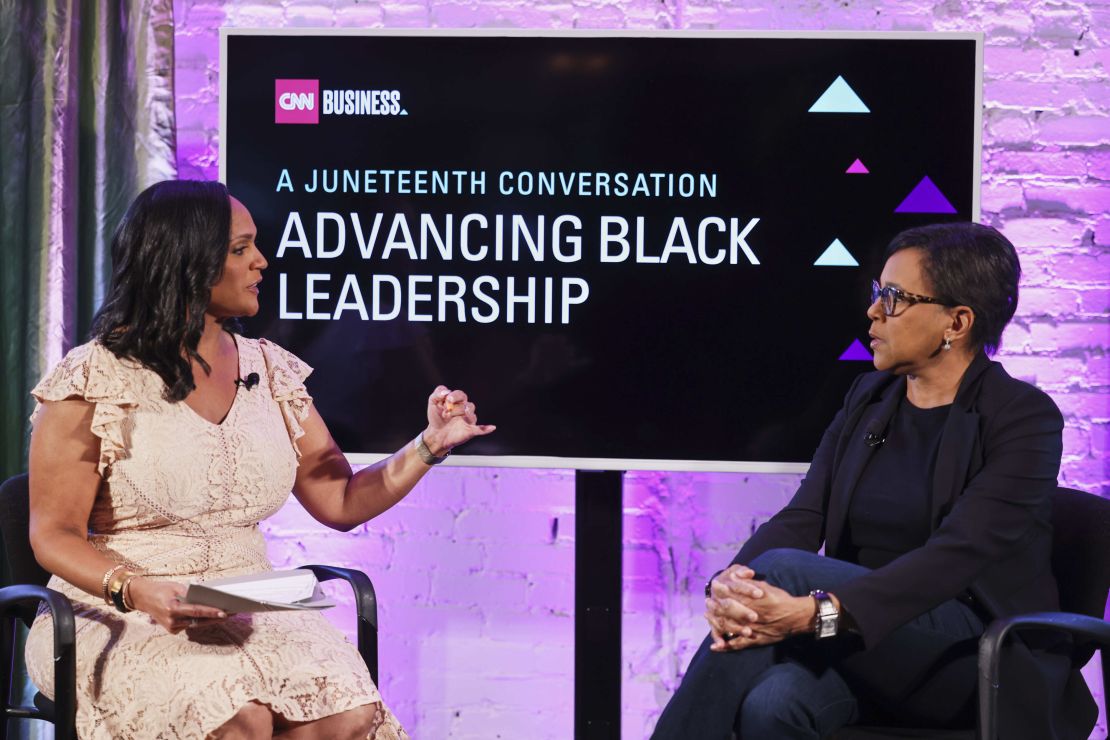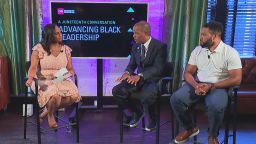Walgreens Boots Alliance CEO Rosalind Brewer is one of the most successful business leaders in corporate America and a leading voice for the Black community at work, in the boardroom and in the healthcare industry. But, as she notes, her rise wasn’t a straight shot to the top.
“I can recall three very significant moves where I took steps down to get up. … I took pay cuts, I took relocations and moves … just to get the development that I needed,” Brewer, one of just two Black women CEOs in the Fortune 500, said Thursday at a Juneteenth conversation on “Advancing Black Leadership,” hosted by CNN.

Getting to the C-suite was never a goal for its own sake. Rather, she said, she sought platforms throughout her career that let her have an impact on the Black community.
One of the times she decided to take a step back came when she went from being a global vice president at Kimberly-Clark to a vice president at Walmart, where half the employees were Black. She would eventually become Walmart’s President and Chief Executive Officer of Sam’s Club, its membership-only retail warehouse club.
“If you really dissect my career, I came into impact roles. I wanted roles where I could influence a lot of employees,” she said. “[At Walmart] I could affect the largest Black employment [pool] across the United States and then globally.”
Brewer’s efforts to advance Black leadership start with her own actions. Executives, she said, need to “walk the talk” and make sure that their team is diverse and that they reach out to Black employees and other people of color early on in their careers.
“When I was that quiet, young, insecure person in corporate America … I knew I could run circles around the conversations that were happening, and I knew the answers. But I actually didn’t have the courage to raise my hand and say the things that needed to be said in those settings. I see that … in my young new hires. So I try to grasp and pull them in,” she said.
When she decided to take the CEO role at Walgreens, a job she started during the pandemic, the impact she was seeking was far broader.
“Our community didn’t believe in vaccinations, but we were dying at a disproportionate rate due to the coronavirus. … We were able to do some fantastic work and we [got] close to 70 million shots in arms and 50% of that were people of color. … I was really fixated on stopping the death and dying of our people.”
One of the most common questions she heard when Walgreens was trying to educate consumers on the importance of vaccination was “Did you try this on Black people?” (To date, Blacks have been underrepresented in clinical medical trials for several reasons, including lack of physical access to them in their communities, on top of a longstanding wariness given the nation’s history of racism in medical research, including the infamous Tuskegee experiments in which Black men with syphilis were left untreated.)
Brewer wants to help increase ease of access to trials in Black communities.
“We’re announcing that Walgreens will be joining along with pharmaceutical companies to provide access to clinical trials. And because of our physical [locations in Black communities], we can bring black and brown people into these clinical trial processes so that we know more about vaccines as soon as they hit the market and our people are included in that,” she explained. “It’s about bringing important localized health care to people who need it [at] the most affordable and accessible rate.”
Building wealth in the Black community
Advancing the career and health prospects for Black Americans are critical when it comes to the pursuit of greater racial equity in society. But more needs to happen.
Two other keystones are financial literacy and building generational wealth in Black families, said entrepreneur John Hope Bryant during CNN’s “Advancing Black Leadership” panel.
Bryant said that he views social justice through an economic lens. “Financial literacy is the new civil rights issue.”
He founded Operation Hope in the early 1990s to help financially educate and empower Black and other underserved Americans who represent “untapped GDP locked at the bottom of the economic pyramid,” he said.
To date it has distributed $4 billion in capital to underserved neighborhoods, Bryant said. That money has been used to help people buy homes, support small businesses, improve credit scores and teach children about money.
“No one ever gave us a memo on money,” he said.
But that is now changing, because role models are changing, he said, citing Black corporate leaders, entrepreneurs and venture capitalists.
Bryant pointed to himself as a Black businessman who owns hundreds of single-family rental homes. More than half of the contractors he uses are Black-owned businesses, he said, also noting the suit he was wearing Thursday was made by a Black tailor. “Everything is changing.”
Entrepreneur Barry Givens is one of the still-few Black venture capitalists in the United States. Early in his career, he knew of no Black VCs and always had a hard time raising capital. That’s why he cofounded Collab Capital, a $50 million VC firm that funds black tech founders.
“Our tagline is ‘Transforming Black Genius into Generational Wealth,’ because now we have the ability not to only become those wealthy individuals ourselves, but also curate and plant seeds for 100 other black individuals,” Givens said.
Like Brewer and Bryant, Givens discovered there was power in finding one’s purpose and, as he put it, “run[ning] your own race” despite what the world might be telling you to do.
“The second that I started focusing my life on helping others and lifting up community, money found me,” he said.





















